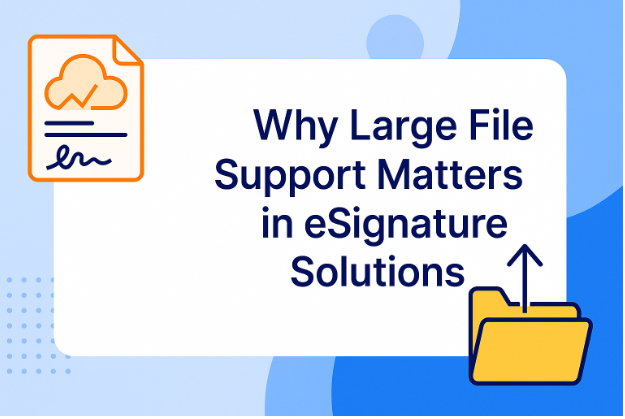Introduction
Digital agreements have become the backbone of modern business operations. From contract approvals to vendor onboarding, eSignatures are no longer optional—they’re essential for efficiency, compliance, and scalability.
However, as business transactions evolve, so do the documents involved. Today, contracts are no longer simple PDFs. They often include high-resolution images, architectural blueprints, detailed annexures, or embedded media, all of which significantly increase file size.
This growing document complexity is creating a new challenge: many eSignature solutions still impose restrictive file size limits, forcing users to find workarounds that slow down workflows.
So, why does large file support matter, and how does it impact your organization’s productivity?
2. Industry Challenge: The Reality of Large Files in Digital Agreements
Not all industries work with lightweight documents. In fact, some sectors inherently require large and complex files for regulatory, operational, or contractual reasons. For example:
- Legal & Corporate: Mergers and acquisitions often involve hundreds of pages with annexures, exhibits, and supporting documentation.
- Construction & Engineering: Contracts may include detailed CAD drawings, 3D blueprints, and multiple high-resolution design files.
- Healthcare & Pharmaceuticals: Regulatory documents may include patient records, imaging files, and compliance-heavy attachments.
- Financial Services & Auditing: Audits and reports often embed charts, visualizations, and raw data files that increase file size.
When these files exceed the typical 10–25MB upload limit of many eSignature platforms, teams are forced to:
- Compress files (risking loss of clarity and quality)
- Split documents into multiple parts (adding confusion)
- Resort to external file-sharing tools (creating security and compliance risks)
The result? More friction, slower processes, and higher operational risks.
3. Existing Solutions: Where Legacy Platforms Fall Short
Popular eSignature solutions like DocuSign and Adobe Sign dominate the market, but they often struggle with large file handling. Many organizations find themselves bumping into restrictive size limits, leading to unnecessary extra steps just to get a document signed.
This is particularly problematic for enterprises that need end-to-end digital workflows without interruptions. A single size limitation can derail efficiency and delay critical transactions.
When evaluating options, many decision-makers start with a comparison of DocuSign and Adobe Sign—but realize that file size flexibility is one of the most overlooked yet crucial factors for scaling digital agreements.
So, what’s the smarter alternative for organizations dealing with large, complex files daily?
4. Alternative to Legacy eSign: Seamless Large File Support and Beyond
Certinal was designed with enterprise-scale needs in mind, including industries that routinely handle large and complex documents. Unlike legacy platforms, Certinal supports file uploads up to 250MB without requiring compression, splitting, or external file-sharing tools.
But large file support is just one part of the equation. Certinal also delivers:
- 50% more cost savings compared to traditional eSignature providers, making it ideal for organizations with high-volume signing needs.
- 100+ native integrations with leading enterprise tools, ensuring contracts move smoothly within your existing workflows.
- Enterprise-grade security and compliance, ensuring sensitive data remains protected, even with large files.
- Recognition as a Leader in IDC MarketScape and a 4.4 rating on Gartner Peer Insights, validating its reliability.
For businesses looking for a scalable, flexible, and secure solution, Certinal goes beyond just signing—it enables smarter document management at scale.
You can learn more about how Certinal simplifies workflows with electronic signatures designed for enterprise efficiency.
5. Real-World Adoption: How Enterprises Benefit
Certinal’s approach has already helped enterprises across various sectors overcome the limitations of legacy platforms:
- A global construction firm now seamlessly signs multi-gigabyte blueprint-heavy contracts without delays, reducing project approval times by 40%.
- A legal consultancy working on high-stakes corporate mergers eliminated the need for document splitting, improving client satisfaction and turnaround time.
- A healthcare provider securely signs compliance-heavy documents with embedded imaging files—ensuring both speed and data security.
These real-world examples show how large file support is more than just a convenience—it’s a critical enabler of efficiency and compliance for industries dealing with complex documentation.
6. Conclusion: Future-Proof Your Digital Agreement Workflows
As organizations continue to digitize their operations, document complexity will only increase. Choosing an eSignature solution that cannot handle large files without friction can lead to workflow bottlenecks, security risks, and unnecessary operational costs.
Certinal offers a smarter path forward—combining enterprise-grade scalability, cost-effectiveness, and superior user experience in one platform.
Ready to eliminate file size frustrations and streamline your digital agreements?
Book a demo with Certinal today and see how effortless large file signing can be.


